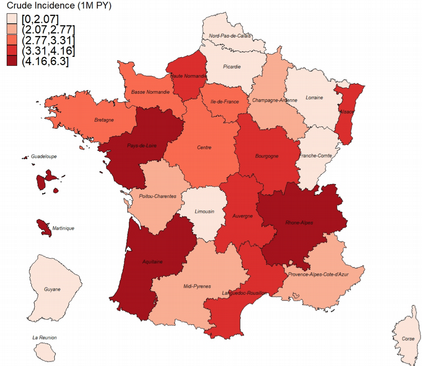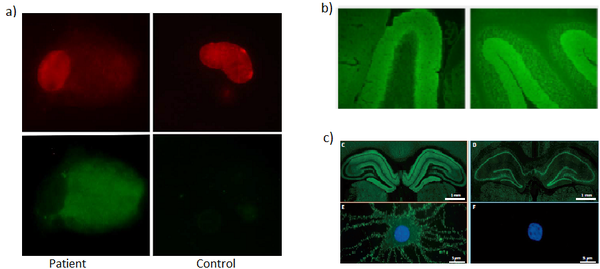BETPSY project
BETPSY Project
Biomarkers in autoimmune EncephaliTis and
Paraneoplastic neurological SYndromes
Autoimmune encephalitis (AE) and paraneoplastic neurological syndromes (PNS) are rare neuroimmune syndromes with a wide range of clinical presentation but without pathognomonic clinical sign facilitating the diagnosis. Moreover, these syndromes are probably under diagnosed with only 300 patients diagnosed in 2018 out of 800 predicted.

The crude diagnostic in France
Although rare, the diagnosis of AE or PNS is essential, as despite severe neurological symptoms, patients can be cured by appropriate immunotherapy. These syndromes are characterized by the presence in the serum and cerebrospinal fluid of autoantibodies directed against neuronal targets. These autoantibodies are highly specific of AE and PNS and can be used as biomarkers of the disease.

a) Cell Based Assay tests on transfected cells b) Immunohistochemistry of antibodies in CSF NMDAr positive with rat hippocampus (left) LGI1 positive with rat cerebellum (right), c) Encephalitis associated with cell surface antigen (left) and with intracellular antigen (right)
Their presence strongly suggests an autoimmune origin and in many cases a good prognosis after immunotherapy. Without these biomarkers the diagnosis cannot be made. A specific role of some autoantibodies in pathophysiology is also suspected. However, in several highly suspected AE or PNS cases no specific autoantibody has been identified leading frequently to inappropriate treatment. Furthermore, as the exact mechanisms of AE and PNS are still unknown, treatments are not optimal and in some cases ineffective. Genetic heterogeneity may underlie in part the variability of the clinical manifestations and of the response to treatment. Moreover, there is no prognosis biomarker able to predict patient sensitivity to immunotherapy and there are only few clues to know how the immune system can provoke the neuropsychiatric symptoms observed in the patients.
The BETPSY project aims to identify new biomarkers with their signaling pathways to produce diagnostic tools, to create new strategies to investigate mechanisms involved in immune diseases, and to design animal models. We will draw from our expertise built over 20 years in AE and PNS. The purpose of our project is to use a unique patient cohort constituted from two French reference centers on rare neurological syndromes to identify new antigenic targets and to validate biomarkers of the disease as well as to identify genetic hallmarks of the patients. The BETPSY project will make it possible to better characterize AE and PNS patients to identify new diagnostic and prognostic biomarkers and develop new diagnostic kits. This will lead to a better and early diagnosis, as well as treatment improvement.


